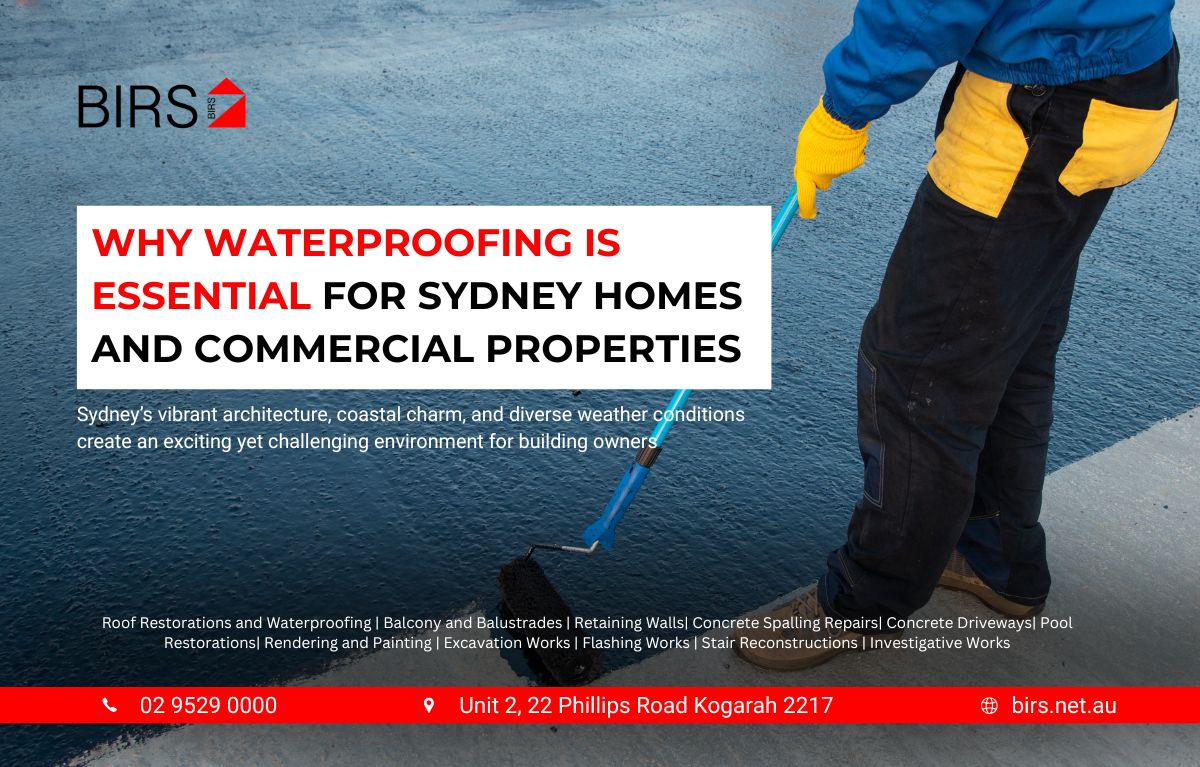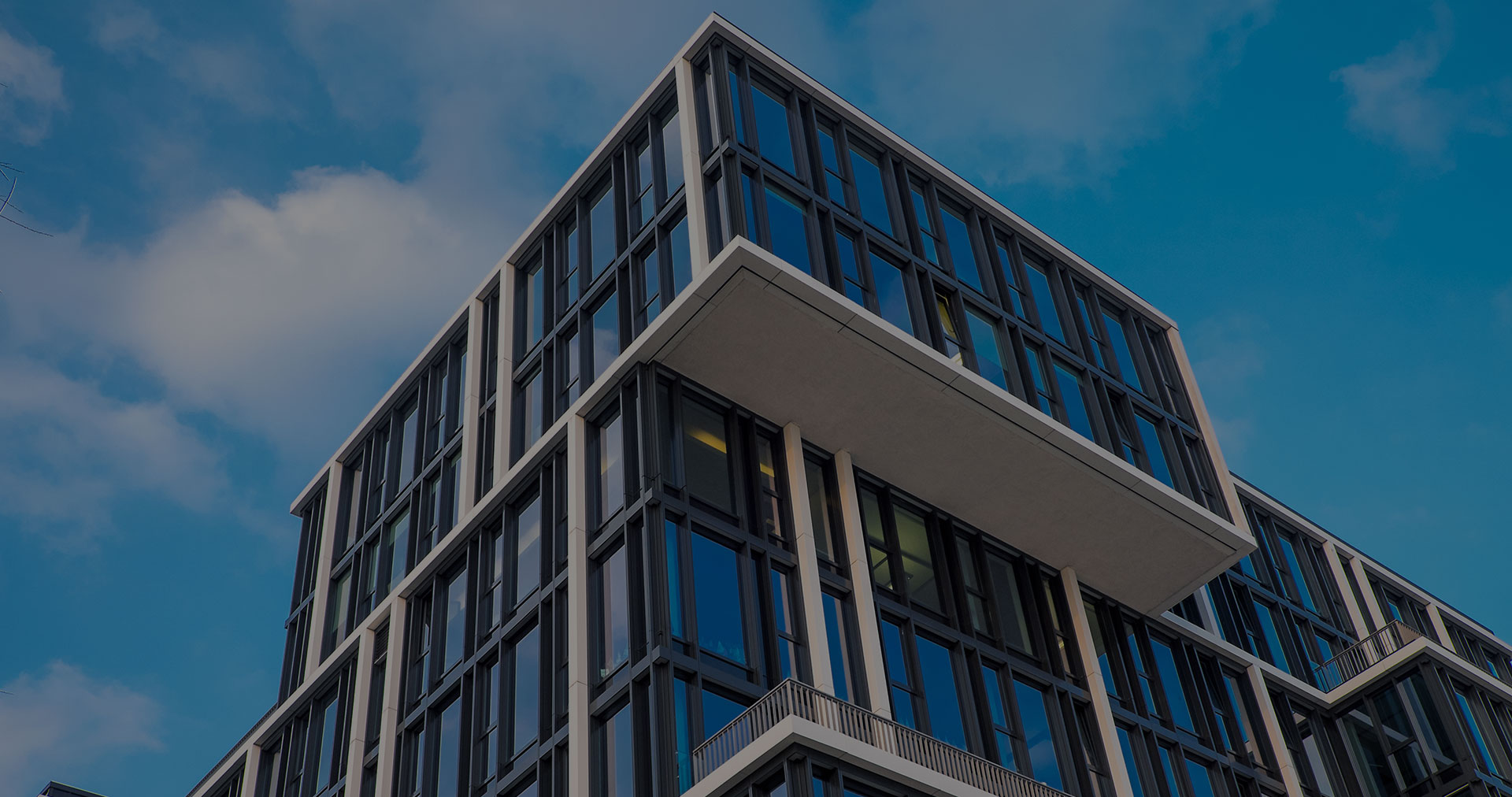
21 Apr Why Waterproofing Is Essential for Sydney Homes and Commercial Properties
Sydney’s vibrant architecture, coastal charm, and diverse weather conditions create an exciting yet challenging environment for building owners. Whether you’re managing a family home in the suburbs or a bustling commercial complex in the CBD, one thing remains universally crucial—waterproofing.
In a city that experiences intense sun, torrential rain, and occasional flooding, waterproofing isn’t just a protective measure—it’s a necessity. It safeguards your building’s structural integrity, prevents costly damage, and ensures your property stands the test of time. At BIRS (Building Improvement and Restoration Services), we are leading providers of waterproofing services in Sydney, offering comprehensive solutions to protect both residential and commercial properties.
In this blog, we’ll explore:
- The importance of waterproofing
- Common waterproofing areas in buildings
- Signs your property needs waterproofing
- Benefits for both homes and commercial spaces
- Why BIRS is the name you can trust
Understanding Waterproofing
Waterproofing is the process of making a structure resistant to water ingress. It involves applying membranes, coatings, or sealants to vulnerable areas such as roofs, basements, balconies, and bathrooms.
Proper waterproofing ensures that water cannot penetrate through surfaces, thereby preventing internal leaks, mould growth, and structural damage. It is particularly crucial in a climate like Sydney’s, where seasonal rainfall and humidity pose continuous risks.
Why Waterproofing Is Non-Negotiable in Sydney
Sydney’s Unpredictable Weather
Sydney is known for its climatic diversity—from intense summer downpours to coastal humidity and salt-laden air. These environmental conditions can wreak havoc on unprotected surfaces, accelerating wear and creating perfect conditions for leaks and dampness.
Increased Risk of Structural Damage
When water seeps into foundations, walls, or ceilings, it can compromise structural integrity. Cracked render, rotting timber, and corroded steel reinforcements are often the result of long-term water exposure.
Property Value and Compliance
A building plagued with leaks or mould is not only less valuable but may also fail inspections or breach Australian building codes. Waterproofing ensures compliance, enhances appeal, and sustains property value.
Prevents Mould, Mildew, and Health Hazards
Moisture leads to mould—and mould means respiratory issues, allergies, and a compromised indoor environment. Effective waterproofing stops moisture at its source.
Minimises Long-Term Repair Costs
Preventative waterproofing is significantly more cost-effective than repairing water-related damage. Once issues like damp insulation or foundational erosion set in, restoration becomes both time-consuming and expensive.
Areas That Require Waterproofing in Sydney Homes
Roofs
Whether pitched or flat, tiled or metal, roofs are the first point of contact during storms. Professional waterproofing stops water ingress before it seeps through.
Balconies and Terraces
Balconies are exposed year-round to weather elements. Poor drainage and water accumulation can lead to internal leaks and structural deterioration.
Bathrooms and Wet Areas
These are moisture-intensive zones. Waterproofing beneath tiles in showers, around bathtubs, and under sinks is essential to prevent hidden leaks.
Basements and Underground Structures
Basements are highly prone to seepage. Waterproofing walls and flooring in underground areas protects against flooding and ground moisture.
External Walls and Cladding
External walls must be protected with breathable yet water-resistant membranes to prevent damp patches and peeling paint.
Waterproofing for Commercial Properties
Flat Roofs on Commercial Buildings
Flat roofs are common in commercial properties. Without proper drainage and membrane systems, pooling water can cause cracks, rust, and internal damage.
Car Parks and Loading Bays
Heavy vehicle movement and exposure to rain require durable, sealed surfaces that resist water penetration and wear.
Basement Car Parks and Lift Pits
These structures sit below ground level, making them extremely vulnerable to water ingress. Waterproofing is critical to maintain safety and usability.
Expansion Joints and Façades
Large commercial buildings use expansion joints that can let in water if not sealed correctly. External façades also need waterproofing to maintain appearance and structure.
Planter Boxes and Retaining Walls
Aesthetic elements such as planter boxes can trap water against walls. Waterproofing prevents root moisture from damaging structural elements.
Signs Your Property Needs Waterproofing
Water stains on ceilings or walls
Peeling paint or bubbling render
Efflorescence (white powdery deposits) on bricks
Musty odours or visible mould growth
Damp carpet or timber flooring
Cracks in walls or foundations
Ponding water on roofs or balconies
If you’ve noticed any of these signs, it’s time to consult the experts.
Benefits of Professional Waterproofing
Peace of Mind
With certified waterproofing, you can rest easy knowing your building is protected from future water damage.
Improved Energy Efficiency
By preventing dampness, waterproofing helps maintain insulation performance and reduces heating and cooling costs.
Longevity of Building Materials
Moisture is a silent destroyer. Keeping it out prolongs the life of concrete, timber, steel, and plasterboard.
A Healthier Living and Working Environment
No mould. No moisture. Just clean, breathable air.
Increased Property Value
Waterproofed properties show better on the market and often command higher sale prices.
Why Choose BIRS for Waterproofing Services in Sydney?
Licensed and Registered Building Practitioners
Specialist Remedial Experience in Residential and Commercial Buildings
Use of Premium Waterproofing Materials
Thorough Site Inspections and Reporting
Tailored Solutions for Each Property
Service Across Sydney Metro and Major NSW Regions
Our Waterproofing Process
Site Assessment
Comprehensive analysis of current conditions
Identification of Problem Areas
Highlighting existing and potential weaknesses
Material Selection
Choosing the appropriate waterproofing membrane or sealant
Application
Professional installation using industry-best practices
Post-Installation Testing
Ensuring full protection with water ingress simulations
Maintenance Advice
Guidance for long-term performance
Waterproofing Systems We Use
Liquid Membranes
Seamless and flexible for roofs and wet areas
Sheet Membranes
Perfect for basements and below-ground structures
Cementitious Waterproofing
Ideal for retaining walls and concrete structures
Bituminous Coatings
Durable and UV-resistant for commercial roofs
Polyurethane Membranes
High-performance option for exposed areas
Customer Testimonials
“The waterproofing job BIRS did on our terrace has been flawless. No more leaks, even after Sydney’s heaviest storms!” — Laura, Coogee
“As a property manager, I’ve worked with several contractors. BIRS stands out for their professionalism and results.” — Tim, Inner West
FAQs About Waterproofing in Sydney
How long does waterproofing last?
Depending on the system used, waterproofing can last 10–20 years or more.
Is waterproofing covered by warranty?
Yes. At BIRS, we provide up to 10-year warranties on most systems.
How much does waterproofing cost?
Costs vary based on size, area, and materials used. Expect anywhere from $500 to $5,000+, depending on the scope.
Can you waterproof existing buildings?
Absolutely. Our remedial waterproofing solutions are ideal for both new and existing properties.
Conclusion
Water is one of your building’s greatest enemies—silent, persistent, and destructive. With Sydney’s challenging weather conditions, waterproofing is not optional—it’s essential. Whether you’re looking to protect a family home or future-proof a commercial property, BIRS provides the experience, materials, and reliability you need.
Call us today or visit www.birs.net.au to book your professional waterproofing assessment and secure your property’s future.



No Comments